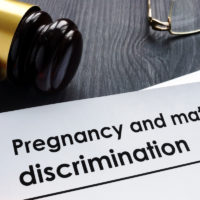EEOC Settles Pregnancy Discrimination Case Where Employer Refused To Accommodate Pregnant Worker

Having represented pregnancy discrimination victims for almost twenty years, our Marion County, Florida wrongful discharge attorneys have learned that employers frequently discriminate against pregnant employees by refusing to accommodate their pregnancy-related physical restrictions. Under the Pregnancy Discrimination Act (PDA), employers are prohibited from discriminating against an employee on the basis of pregnancy, childbirth, or related medical conditions. The PDA further mandates that women affected by pregnancy, childbirth, or related medical conditions must be treated the same as non-pregnant employees who are similar in their ability or inability to work.
In many cases, pregnant workers are under physician-ordered physical restrictions because of their pregnancy, such as restrictions on standing, walking, or lifting. When pregnant workers have physical restrictions because of their pregnancy, employers must treat them the same as non-pregnant employees who are similar in their ability or inability to work. This means that if an employer accommodates non-pregnant employees with physical restrictions, such as by providing them with light duty, then the employer must also accommodate pregnant employees with similar physical restrictions. A pregnancy discrimination lawsuit recently settled by the U.S. Equal Employment Opportunity Commission (EEOC) illustrates that an employer’s refusal to accommodate a pregnant worker’s lifting restriction may violate the PDA.
EEOC Claims Pregnancy Discrimination
In a press release issued on July 12, 2019, the EEOC announced that it has entered into a Consent Decree to settle a pregnancy discrimination lawsuit filed by the EEOC against Party City Corporation (Party City) pursuant to the PDA. On March 7, 2019, the EEOC filed the lawsuit, U.S. Equal Employment Opportunity Commission v. Party City Corporation, Case No. 4:19-cv-824, in the U.S. District Court for the Southern District of Texas after initially attempting to reach a pre-litigation settlement through its statutorily mandated conciliation process. The EEOC brought the pregnancy discrimination lawsuit on behalf of a former employee of Party City, Jahneiss Groce (Groce). In this article, our Marion County, Florida wrongful discharge lawyers explain the EEOC’s allegations against Party City and the Consent Decree.
EEOC’S Allegations Of Unlawful Firing
In April 2015, Groce began working for Party City as a team lead at its store in Pearland, Texas. In the fall of 2015, Groce learned that she was pregnant and informed the store’s General Manager of her pregnancy. On December 21, 2015, Groce’s doctor issued light duty restrictions consisting of “no lifting over 10 lbs. and no climbing ladders.” The job description for team lead lists the physical requirements of the position: “lift, push, pull 25 pounds,” “frequent kneeling, bending, and stooping,” “climb ladders,” and “standing entire shift.” However, nothing in the job description identifies the actual duties of the position or designates between essential and non-essential job duties. Groce submitted the doctor’s note to the General Manager who forwarded it to Party City’s human resources office.
Party City’s human resources office provided Groce with a “light duty” form with instructions to have it completed by her doctor. On January 19, 2016, Groce’s doctor completed the light duty form. Groce’s doctor indicated that she could stand and walk eight hours a day, could not climb, and could not lift more than 10 pounds. On February 1, 2016, Groce received a letter from Party City stating that “when your doctor releases you to return to work and, if you would like to return to work at Party City, you may apply for an open position for which you are qualified.” The EEOC claims that by refusing to accommodate her pregnancy-related medical restrictions, Party City fired Groce because of pregnancy-related medical conditions in violation of the PDA.
Consent Decree Settling Discrimination Lawsuit
In the Consent Decree settling the lawsuit, which was signed by U.S. District Judge Ewing Werlein on July 12, 2019, Party City agreed to pay $39,000 to Groce in order to resolve the pregnancy discrimination lawsuit. In the Consent Decree, Party City also agreed to adopt an anti-discrimination policy that expressly prohibits discrimination, harassment, and retaliation against any employee or job applicant in violation of the federal anti-discrimination laws. Party City further agreed to provide training to store-level managers regarding equal opportunity in the workplace, the avoidance of any unlawful discrimination, and employees’ rights under the federal anti-discrimination laws.
EEOC Enforces Employees’ Rights
The EEOC is the administrative agency of the United States responsible for interpreting and enforcing federal laws forbidding employment discrimination. In enforcing the federal civil rights laws, the EEOC is also authorized by federal law to bring lawsuits on behalf of victims of employment discrimination, including victims of pregnancy discrimination. In a press release issued by the EEOC regarding the case, a Regional Attorney for the EEOC’s Houston District Office, Rudy Sustaia, stated that the “EEOC will vindicate the rights of pregnant employees who are discriminated against.”
Free Consultation With Ocala Wrongful Discharge Lawyers
Based in Ocala, Florida and representing employees throughout Central Florida, we have represented employment discrimination victims in hundreds of cases before the EEOC. If you have been wrongfully fired on the basis of pregnancy or have questions about your employee rights under the federal anti-discrimination laws, please contact our office for a free consultation with our Marion County, Florida wrongful termination attorneys. Our employment and labor law attorneys take wrongful discharge cases on a contingency fee basis. This means that there are no attorney’s fees incurred unless there is a recovery and our attorney’s fees come solely from the monetary award that you recover.